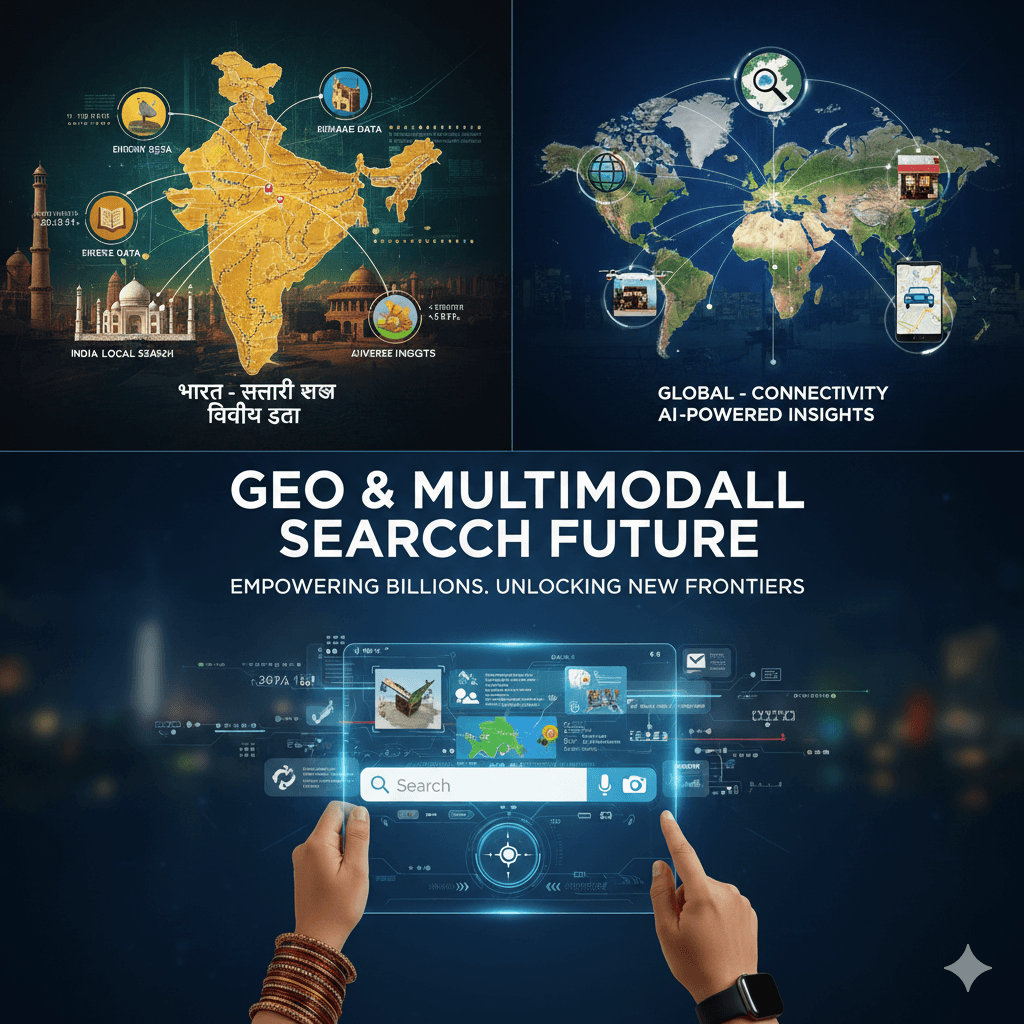
14 Nov 2025
The future of search is no longer limited to typed queries. In a new day, characterized by multimodal GEO, students, educators, and professionals are seeing a complete redefinition of how information is found and rated and the manner in which data are ingested. No more are the days when a simple text will dominate search engines. AI search today combines text, voice, images and video, offering an immersive and context-rich environment for discovery.
In this new age, video SEO is as (if not more) important than written SEO, as students prefer videos to explanations! In the heart of this transition is multimodal search with AI and GEO (Generative Experience Optimization). In this essay, we take a deeper look at where multimodal GEO is heading, how you can use it for study abroad,and what platforms such as Edysor.ai are leading the way with this new digital revolution.
In multimodal GEO (Generative Experience Optimization), because I know contextually and personally what the industry is up to, it’s gonna need to start serving us images, text, voice and video across our results. But rather than text-heavy traditional search, multimodal search is a practice that mirrors the way human beings actually consume information — in multiple formats simultaneously.
For example:
Which is to say multimodal GEO is not about finding answers, but living them in different content forms — blogs, reels, podcasts or videos.
India stands at the tipping point of a digital revolution, with millions of students using AI search for education and career planning, and connecting to global opportunities. Multimodal GEO is important in India because:
For Indian users, Geo multimodal makes sure that the information is not just more engaging but also more available on devices and languages.
Multimodal GEO is the future of search, and that revolution will extend well beyond education.
On a worldwide basis, it will make education faster, multilingual and universal through multimodal searching. It's a harbinger for a future in which AI search and video SEO is not an optional thing but the basis of finding knowledge.
AI search is the underlying workhorse behind multimodal GEO. It ensures that:
AI search is shaping SEO into a dynamic, writers to converge in multimodal environments so that users take in what matters most to them.
Video SEO is being integrated into multimodal GEO. Because for how-to queries, where they’re looking on YouTube, or Instagram, or TikTok — not simple blogs — search engines are now showing videos even if by doing so they are not pleasing everyone.
The impact:
Multimodal GEO makes classic SEO without video SEO pointless.
Prior to the coming of Blog AI, producing multimodal GEO content had long been an obstacle for students as well as teachers and consultants. Among the major challenges were:
With Blog AI, those challenges become opportunities—and couldn’t be more in sync with how SEO operates today:
This is where Edysor.ai comes in. For students preparing for studying abroad, Edysor is not just another consultancy. It’s an AI-powered platform that harnesses multimodal GEO to deliver interactive, SEO-driven content that accelerates decision-making.
This blog + video + SEO combination is what leads to an Edysor. ai content scores very high on all these GEO platforms, making it convenient for the students to consume study abroad information in multiple engaging ways.
This fusion is at the core of multimodal GEO, ensuring students consume relevant information faster.
There’s Aarav, a student in Jaipur who always wanted to go and study in Canada. Rather than taking months slogging through disconnected websites, Aarav turned to Edysor.ai’s multimodal GEO- optimised 1 blogs and videos.
Result? Good enough; within weeks he has trimmed his target universities, submitted on time, and gotten a scholarship by context-aware GEO suggestions. Aarav’s transformation is a testament to how what Edysor.ai brings together blogs, podcasts and videos for a demographic.
CTA: If you’re a student planning your study abroad journey, explore Edysor.ai today and experience the power of multimodal GEO for your future.
Which of the following reflects multimodal GEO?
a) Only blog-based SEO
b) Video + blog optimization with AI search
c) Backlinks only
d) Paid ads
Answer: (b) Video + blog optimization with AI search
The future of search is not longer just about type text on a search bar. In the era of multimodal GEO, online experience has become smarter, contextual and more humanly. By combining blogs with video clips, podcasts, images and AI snippets – students and professionals can now learn from, engage with, personalised and immersive content. From AI search delivering precision to video SEO managing reach on-the-edge, this paradigm is the next frontier for online experiences.
For students in particular, it has the added benefit of being multimodal GEO – there is content available that can be consumed across a range of formats including 1-minute quick reels, detailed blog posts or podcasts that you can listen to while travelling. This is not simply a search upgrade but an entire reimagination of how knowledge is shared, ranked and consumed.
Platforms like Edysor.ai are leading the charge when it comes to learning, and making sure that people wanting to learn something from around the globe is not only finding information about it, but experiencing it in engaging ways. Through a mix of automation, contextual intelligence and content repurposing, Edysor makes the path to studying abroad smoother, faster and SEO’ified for digital.
CTA: Are you ready to take the next step in your study abroad adventure of search? Discover the power of Edysor.ai today and see what multimodal GEO can do for your reading, exploration, and dreaming.
Q1: What is the difference between traditional SEO and multimodal GEO?
Traditional SEO focused on blogs and text data, whereas multimodal GEO merges blogs, images, podcasts, and videos to deliver contextual results.
Q2: How is video SEO linked to multimodal GEO?
Video SEO ensures videos rank within GEO-driven search, giving them higher engagement.
Q3: Can students trust AI search results?
Yes, with EEAT and plagiarism-free guarantees, AI results are highly reliable when optimized appropriately.
Q4: How does Edysor.ai support multimodal GEO?
By generating AI-powered blogs, creating video snippets, optimizing with video SEO, and pushing content across platforms.
Q5: Will multimodal GEO replace Google search?
Not replace, but enhance it. Future search experiences will be far more interactive with Edysor-like tools leading the way.
By Gunjan Pancholi, Co-Founder & AI Solutions Architect, Edysor.ai | Driving Innovation in Custom GPTs, Voice Agents & Social Bots | Product Strategist | Tech Visionary | Leading R&D in EdTech & Study Abroad Automation | Growth-Focused
LinkedIn Profile: https://in.linkedin.com/in/gunjan-pancholi-216171263
Resources
Others
All rights reserved. Powered by Edysor
